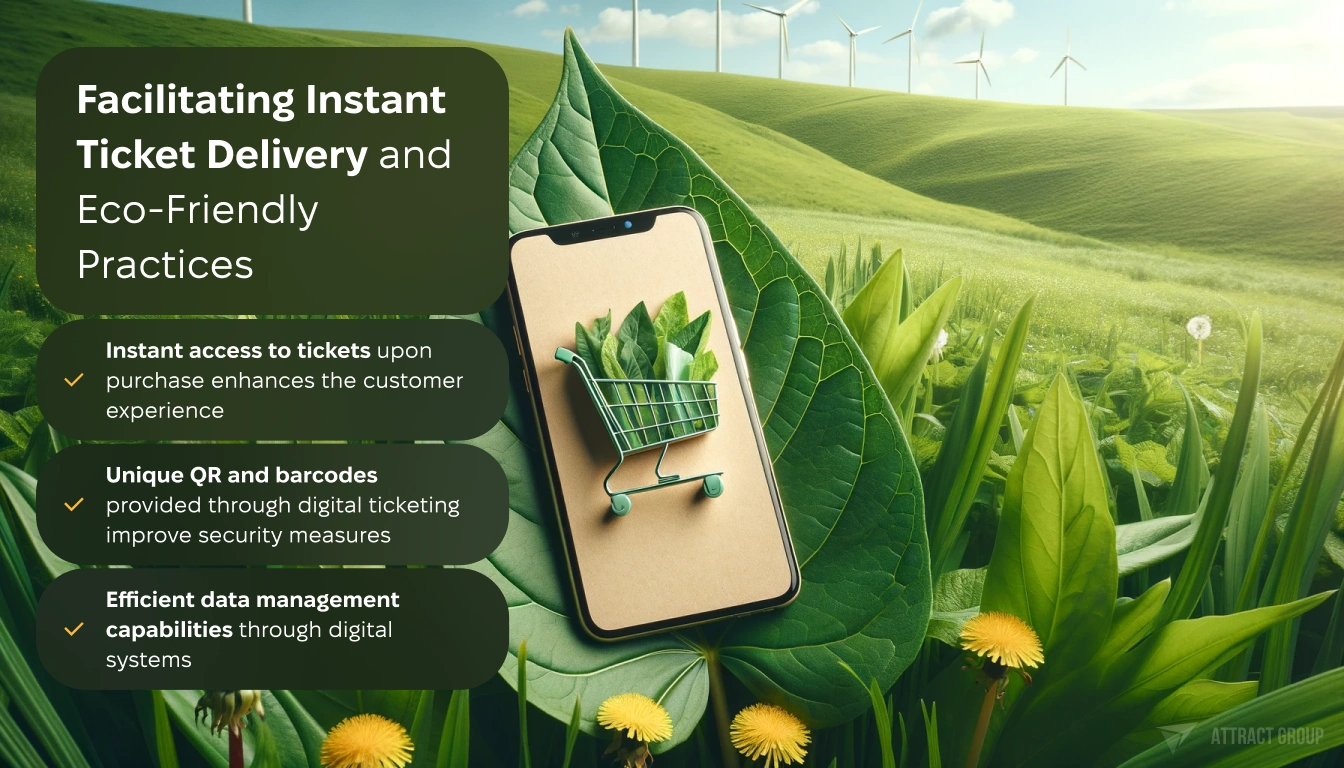Digital Ticketing Integration Strategies with Existing Retail Systems
 31 January 2024
31 January 2024? Listen to the Summary of this article in Audio
As retail continues to adapt to the digital revolution, the integration of technological advancements becomes crucial for a competitive edge. Digital ticketing integration serves as a pivotal factor in this transition, bridging the gap between cutting-edge functionality and core retail practices. Incorporating digital strategies within retail systems not only enhances customer experience but also streamlines operations, making ticketing system integration a cornerstone for future growth.
Integrating online ticketing into retail environments requires a conscientious approach that aligns with the ever-evolving landscape of consumer expectations. The introduction of seamless ticketing integration serves to fulfill this need, ensuring that both legacy systems and new digital tools work in unison. Through effective ticketing platform integration and adept use of ticketing API, retailers can provide personalized customer experiences at scale. Furthermore, ticket management systems play a pivotal role in the orchestration of this harmony between different facets of retail technology.
Mobile ticketing solutions empower customers with the convenience of access from anywhere, at any time, while ticket sales platforms facilitate effortless transactions and data-driven insights. Additionally, advanced event management software offers resourceful components for orchestrating the complexities of retail ticketing. With proper integration, these tools collectively form a cohesive ecosystem, enabling retailers to harness full potential and elevate their service offerings.
Leading the charge in this integration journey entails acknowledging the complexities while charting a course towards a more interconnected and responsive retail environment. By embracing ticketing software integration, retailers pave the way for transformative strategies that resonate with the digital age consumer.
Key Takeaways
- Efficient integration of digital ticketing systems is vital for modernizing retail customer experiences.
- Legacy systems must be seamlessly blended with new digital tools through meticulous ticketing software integration.
- A collaborative approach to ticketing API integration is essential for unified operations and service delivery.
- Adopting mobile ticketing solutions and an online ticketing platform is key to convenience and accessibility.
- Agile ticket management systems enable retailers to adapt swiftly to market demands and consumer trends.
- Event management software enhances event planning and execution, driving customer engagement and satisfaction.
The Significance of Integrating Digital Ticketing in Retail Environments
The implementation of retail ticketing platform integration acts as a transformative step for retailers looking to innovate and stay ahead in a digital-forward market. This integration offers a blend of new digital capabilities with legacy retail systems, promising enhanced customer engagement and greater efficiency in retail operations.

In an era where immediacy and convenience reign supreme, integrating digital ticketing software into the retail space is not simply a luxury—it’s an essential strategy for growth. As consumers gravitate towards businesses that offer frictionless, technologically integrated experiences, retailers must adapt to satisfy these evolving preferences.
Capitalizing on New Digital Capabilities for Enhanced Retail Operations
As the retail industry steers towards more agile and user-focused models, the integration of digital ticketing platform integration is a critical step in capitalizing on new digital capabilities. Key to this is the deployment of digital ticketing software which unlocks the potential of rich data analytics, enhances customer interaction, and streamlines sales processes. This progression towards smart, data-driven decision-making exemplifies the potential that digital capabilities hold for the retail sector.
Strategies for Bridging the Gap Between Traditional and Digital Platforms
One of the primary challenges in integrating e-tickets in retail is the disparity between traditional systems and the innovative requirements of modern digital platforms. The solution lies in establishing a harmonious operating model that allows for seamless collaboration between digital and IT departments. Strategies to achieve successful retail ticketing technology integration involve creating a communication framework that ensures clarity and direction, while also employing technology stacks designed for maximal system stability and scalability. This integrated approach paves the way for agile response to market trends and the successful implementation of innovative digital ticketing solutions.
Navigating the Challenges of Retail Digital Ticketing System Integration
As the retail landscape evolves into a more digitally-driven ecosystem, the integration of digital ticketing systems raises significant challenges that necessitate innovative solutions and strategic foresight. The complexity inherent in melding new technology with time-honored legacy systems calls for a concerted effort in achieving seamless interoperability and data harmony.
Overcoming the Complexity of Retail Legacy Systems
Retailers face the daunting task of modernizing entrenched legacy systems without disrupting existing operations. These systems, often inflexible and siloed, hinder technological integration, impacting both backend processes and customer-facing services. Tackling this complexity starts with a methodical transition plan that slowly phases in digital ticketing data management capabilities while ensuring business continuity.
Software compatibility and API integration
Key to a successful integration is the compatibility between emerging digital ticketing solutions and existing retail software. Strategic utilization of a ticketing API bridges the gap, enabling various systems to communicate effectively. This not only streamlines operations but also sets the stage for the introduction of future innovations within the retail environment.
Data synchronization and security
Data integrity and security are paramount when integrating digital ticketing systems. Secure data synchronization across multiple platforms ensures real-time updates and consistency, which is essential for accurate ticketing and customer service. Emphasizing ticketing system security in retail protects against data breaches, fostering consumer trust and safeguarding sensitive information.

Scalability and Stability Concerns in Retail Ticketing
Retailers must be prepared for varying levels of ticketing demands, especially during peak seasons or events. Digital ticketing scalability ensures systems can handle spikes in usage without performance hitches, while stability guarantees uptime and the constant availability of ticketing services to customers.
Addressing the challenges posed by digital ticketing integration is an ongoing process that calls for the collaboration amongst various stakeholders in the retail industry. By prioritizing these areas, retailers can pave a smoother path towards a fully integrated, future-proof digital ticketing environment, ultimately enhancing customer experiences and driving operational efficiencies.
Creating a Robust Framework for Digital Ticketing Integration in Retail
The retail sector is at a pivotal juncture, where adopting digital ticketing integration has become imperative for market sustainability and growth. A robust framework anchors this shift, harmonizing legacy systems with dynamic digital advancements. This not only ensures streamlined operations but fosters a culture of innovation that resonates with advancements in retail ticketing system innovation.
This framework isn’t just a technological upgrade; it’s a strategic move towards agility and customer-focused improvements. Retailers that excel in ticketing platform integration use agile methodologies to swiftly adjust to market demands, while impeccable ticket management systems simplify logistics and enhance customer satisfaction.
Within this framework lies a golden rule: the essential convergence of online ticketing integration with traditional methods forms the bedrock of a successful retail evolution. It encapsulates a customer-centered vision where data accessibility, system flexibility, and user experience are at the forefront of digital adaptation.
- Centralizing data collection and storage to foster informed decision-making and accessibility.
- Aligning enterprise architectures to support the continuous development of retail capabilities.
- Introducing efficiencies that heighten responsiveness to consumer needs and market trends.
- Building a framework that’s adaptable to future technological shifts and business strategies.
The transformative potential of digital ticketing integration in retail environments cannot be overstated. It stands as a portal to the future, crucial to meeting the high-speed demands of the modern consumer and the ever-competitive landscape of the retail industry.
Centralizing the Role of Technology Teams for Streamlined Integration
To achieve a successful ticketing solution integration, the centralization of technology teams is fundamental. It provides a unified approach that facilitates cohesive governance and shared responsibilities, which are critical elements for the accomplishment of an interconnected retail ticketing platform integration. This is a crucial phase where redefining leadership roles and pooling resources become essential to address both digital and conventional IT needs in a synergized fashion.

The first strategic step in this direction is the transformation of leadership roles. The technology spectrum has broadened, and so, leadership within the tech teams must evolve to embrace a more integrative vision, one that harmonizes digital innovation with established systems.
Redefining Leadership Roles in Technology for Integration Success
To ensure digital ticketing system compatibility, redefining technological leadership roles is essential. By forging hybrid roles that embody a blend of insights into both worlds—digital and conventional IT—organizations nourish a leadership that’s adept at navigating the complexities of modern retail environments. The new frontier of tech leadership involves roles that are both visionary in digital simplicity and reverent to the gravity of proven traditional IT frameworks.
Creating such hybrid roles is more than a structural change—it’s a cultural shift towards interdisciplinary understanding and strategic cross-functional collaboration. It equips leaders with the required toolkit to oversee complex integration projects effectively, ensuring that the resultant operational models are resilient, responsive, and forward-looking.
Centralizing Resources for Digital and Conventional IT Teams
Alongside the innovative evaluation of leadership, the purposeful centralization of resources constitutes the second pillar for achieving seamless ticketing integration. IT-architecture and infrastructure teams especially function more efficiently when moved out of their siloes and into a central repository of expertise. This movement not only leads to the elimination of redundant tasks but also to the standardization of processes, which is imperative in simplifying the convergence of new digital capabilities with legacy technologies.
As these centralized teams work in tandem, they lay down the architectural groundwork for a digital ticketing integration that fortifies the retail sector’s technological framework. This strategic collation of resources inspires a shared vision wherein digital and IT groups effectively contribute to a singular objective: the seamless and secure provision of retail ticketing services. The end goal is the establishment of a singular, comprehensive, and accountable technological leadership structure that embodies the core tenets of cogent integration practices.
Employing Agile Methodologies for Efficient Digital Ticketing Deployments
As retail insight dictates the necessity for evolving transaction modalities, the deployment of digital ticketing systems grows increasingly pivotal. Embracing agile methodologies fortifies the retail sector’s capacity to launch and sustain dynamic digital ticketing platforms. In the dense thicket of today’s technological demands, employing agile practices equates to agility in adapting to the consumer’s ever-shifting needs—a critical response strategy for any retail enterprise.

Agile practices foster an environment of continuous evolution and improvement, endorsing iterative development and regular feedback. The adoption of such methodologies ensures that digital ticketing deployment can transcend mere operability to deliver seamless, user-centric experiences. By amalgamating cross-disciplinary teams, retail businesses can harness the collective expertise necessary for ticketing system integration that resonates with efficiency and innovation.
Moreover, agile approaches to event management software development propagate a versatile solution that caters to a diverse range of retail event landscapes. This versatility manifests itself in the proactive ideation, rapid deployment, and meticulous refinement of ticketing functions—ensuring that consumer satisfaction remains paramount.
“Agile methodologies catalyze the swift ideation and rollout of tailored digital ticketing functions, vital for the retail industry’s continuous alignment with consumer preferences.”
The pivotal role that agile methodologies play in the tapestry of digital ticketing cannot be understated. Below is an illustrative table highlighting the key facets where agile methodologies exert their influence in the digital ticketing deployment:
| Aspect of Digital Ticketing | Agile Methodology Influence |
|---|---|
| Customer Experience | Enables iterative design and constant feedback incorporation, leading to highly receptive user interfaces and processes. |
| Payment Processing | Drives fast-paced development and testing of secure payment solutions, offering reliability and user comfort. |
| System Flexibility | Supports adaptive architectures allowing straightforward ticketing system integration into diverse retail environments. |
| Team Collaboration | Facilitates cross-functional cooperation, promoting a culture of transparency and collective problem-solving. |
| Data Management | Espouses incremental build-out of data analytics, rendering actionable insights with each release cycle. |
| Market Responsiveness | Instills capacity to pivot based on real-time market data, ensuring retail offers align with current trends. |
These agile principles serve as the bedrock upon which retail digital ticketing systems can be erected, guaranteeing not only a strong foundation but also the resilience to weather the capricious whims of market demands. The ultimate payoff of this diligent and flexible methodology is a digital ticketing experience that is not only frictionless but also improvable with each iteration—a quintessential quality in the rapid currents of technological advancement.
Transitioning from Traditional to Digital Ticketing Retail Platforms
The retail industry’s evolution toward digital integration signifies a bold step forward with the adoption of digital ticketing. This technological pivot opens up a panoply of benefits, revolutionizing how retailers manage and distribute tickets for events, sales, and promotions.
Identifying Digital Ticketing Advantages in Retail
Digital ticketing advantages are wide-ranging and influential in refining the retail experience. Primary benefits include streamlined processes and enhanced customer engagement—redefining convenience and efficiency. Retailers leveraging mobile ticketing solutions can offer personalized services, reduce queue times, and quickly adapt to consumer preferences with targeted promotions and events. Moreover, the data generated from online ticketing platforms provides invaluable insights that can be used to optimize operations and tailor marketing strategies.
Facilitating Instant Ticket Delivery and Eco-Friendly Practices
The immediate fulfillment of ticketing needs is another facet where digital ticketing shines, with instant ticket delivery emerging as a game-changer. Interactions that once required physical exchange now transpire in microseconds, delivering tickets directly to consumers’ devices. This expedited process not only elevates customer satisfaction but also embodies eco-friendly ticketing by virtually eliminating the need for paper-based alternatives, contributing to environmentally sustainable practices within the retail sector.
- Instant access to tickets upon purchase enhances the customer experience, offering convenience and eliminating the need for physical pickup.
- Unique QR and barcodes provided through digital ticketing improve security measures, reducing the likelihood of fraudulent activities.
- Efficient data management capabilities through digital systems expedite registration and attendance tracking, simplifying event logistics.
With these compelling advantages, the transition to online ticketing platforms represents a strategic imperative for retailers aiming to thrive in the digital age, presenting opportunities to forge a deeper connection with customers through innovative service delivery and sustainable business practices.

Guidelines for Implementing a Retail Ticketing Integration Plan
Implementing a comprehensive digital ticketing integration strategy is essential for retailers aiming to remain competitive in today’s digital marketplace. A well-executed integration plan can result in seamless user experiences, operational efficiencies, and enhanced customer engagement. Below are the critical steps that retailers must consider when developing their integration playbook.
Firstly, choosing the correct ticketing platform integration partner plays a critical role. Retailers need to select a reputable platform that guarantees security and supports a range of payment options, ensuring that customers have the flexibility they expect when making purchases.
Secondly, the design and customization of digital event pages should be aimed at capturing the attention of the target demographic. An engaging platform with intuitive user interfaces encourages customer interaction and brand loyalty.
Retailers must also consider the importance of market presence and leverage social media to effectively promote events and offers. Here’s where a robust ticketing API integration becomes invaluable, as it enables seamless connectivity between different systems, ensuring coherence in promotion and ticket sales.
Furthermore, customer service cannot be overlooked. A dedicated support team is crucial in building and maintaining trust with customers, especially when integrating new technologies. In this context, the following table highlights important aspects to keep in mind:
| Key Aspect | Action Items | Expected Outcome |
|---|---|---|
| Selection of Ticketing Platform | Perform due diligence on platform security and payment diversity. | A secure, dynamic platform that aligns with customer payment preferences. |
| Customization of Event Pages | Use brand elements and user-friendly design to engage customers. | An attractive, easy-to-navigate digital event space enhancing user experience. |
| Social Media Integration | Optimize the use of social channels for wider reach and impact. | Increased event visibility and customer interaction. |
| Customer Support and Technical Assistance | Instill a reliable customer support framework with proficient technical assistance. | Improved customer satisfaction and swift resolution of technical issues. |
| Payment Gateway Integrations | Incorporate multiple payment options like Stripe, PayPal for user convenience. | A frictionless payment experience for customers encouraging purchase completion. |
| Email Ticket Confirmations | Implement a system for instant ticket confirmations via email following purchases. | Immediate acknowledgment of transaction, enhancing customer trust. |
As this framework demonstrates, each aspect of introducing retail ticketing technology to your retail operation is integral to delivering a unified and satisfactory customer journey. By following these guidelines, retailers can ensure that their ticketing system integration aligns with user expectations, security standards, and industry best practices, leading to positive outcomes for both the business and its customers.
Conclusion
The horizon of retail is rapidly advancing towards a future where digital ticketing system innovation stands at the forefront of reshaping consumer interactions. By weaving together the threads of technological prowess and customer-centric design, digital ticketing systems are set to revolutionize the dynamics of the retail landscape. This transformation is not merely imminent; it is already underway, signaling a seismic shift in how retail experiences are curated and delivered. A pivotal component of retail’s evolution, retail ticketing system innovation symbolizes a new age of efficiency and strategic market presence.
Future Outlook for Retail Ticketing System Innovation
Speaking of innovation, retailers that master the art of integrating advanced digital ticketing platforms are forging a path to a future enriched by both sophistication and simplicity. The imminent progression in the sector is destined to be powered by systems that prioritize user experiences, replete with robust security protocols and frictionless interactions. As customers continue to favor immediacy and personalized service, the retail entities that adapt will thrive. The continual evolvement and upgrade of digital systems are guaranteed to sustain and nurture this growth, catalyzing a competitive edge that resonates with the modern, digitally-savvy shopper.

Evaluating the Success of Digital Ticketing Integration Strategies
Evaluating digital ticketing strategies is pivotal in determining their effectiveness and lasting impact on retail operations. Metrics such as process efficiencies, cost reduction, and bolstered security measures serve as the benchmarks for gauging digital ticketing system success. With digital solutions increasingly embedded into the fabric of the retail industry, the ability to adapt swiftly to market changes becomes a defining trait of a successful integration. Organizations that not only adopt but also continuously refine their digital ticketing platforms ensure their standing at the vanguard of customer service excellence and technological innovation.
FAQ
What are the key strategies for digital ticketing integration with existing retail systems?
Key strategies include seamless ticketing integration through APIs, compatibility between new online ticketing platforms and legacy systems, and integrating mobile ticketing solutions compliant with existing event management software and ticket sales platforms. It requires a thorough understanding of the ticketing system and a methodical integration process.
Why is integrating digital ticketing in retail environments significant?
Integrating digital ticketing in retail allows businesses to capitalize on new digital capabilities for enhanced operational efficiency, better customer engagement, and the possibility of rolling out innovative business models. It is essential for retailers to maintain competitiveness and meet consumer expectations for seamless experiences.
What are the challenges of integrating digital ticketing systems in retail?
Challenges include overcoming the complexity of integrating with legacy systems, ensuring compatibility and secure API integration, managing data synchronization, ensuring robust security to protect sensitive customer information, and ensuring the scalability and stability of the ticketing system to handle varying demands.
How can retailers create a robust framework for digital ticketing integration?
Retailers can create a robust framework by aligning digital initiatives with legacy systems, implementing agile IT service provisions, and fostering an innovation culture with retail ticketing system innovation. An integrated approach to managing technology stacks is crucial.
What roles do technology teams play in streamlined ticketing system integration?
Technology teams are central to the integration process, ensuring cohesive governance and shared responsibilities. This necessitates the redefinition of leadership roles, centralization of resources, and fostering collaboration between digital and conventional IT teams, which are foundational to achieving digital ticketing system compatibility and seamless integration.
How do agile methodologies enhance efficient digital ticketing deployments in retail?
Agile methodologies promote a nimble, collaborative approach which ensures retail organizations can quickly adapt to changing requirements and market trends, leading to more efficient deployments of digital ticketing solutions by reducing implementation times and improving service quality.
What advantages does digital ticketing offer in retail?
Digital ticketing offers numerous advantages, including the facilitation of instant ticket delivery, enhancing convenience for customers. It supports eco-friendly practices by reducing paper waste, and improves security and efficiency in tracking event registrations and attendance.
What are the essential guidelines for successful retail digital ticketing integration?
Guidelines include choosing a secure and versatile ticketing platform, ensuring support for diverse payment methods, engaging event promotion, and providing excellent customer support. Retailers must also focus on integrating secure payment gateways and utilizing features like automatic email confirmations to streamline customer experience.
How can the success of digital ticketing integration strategies be evaluated in retail?
The success of digital ticketing strategies can be evaluated by measuring increases in process efficiencies, reduction of operational costs, enhanced security measures, and the flexibility and adaptability of the ticketing system in a rapidly changing retail environment.










